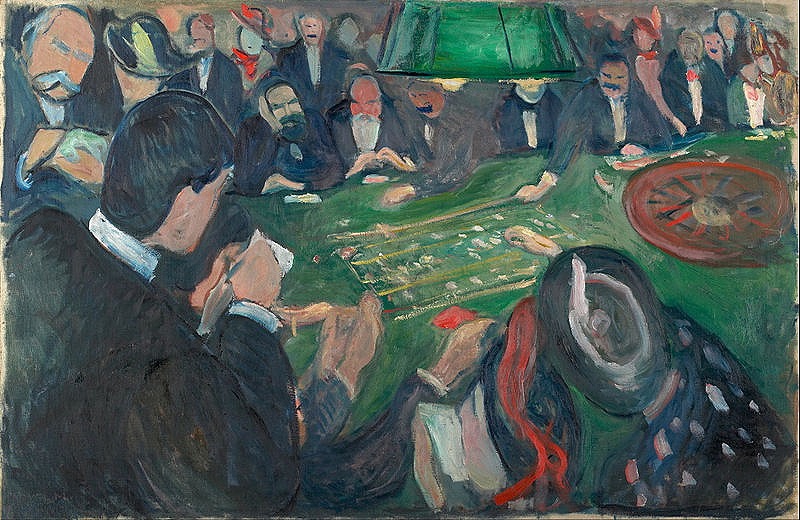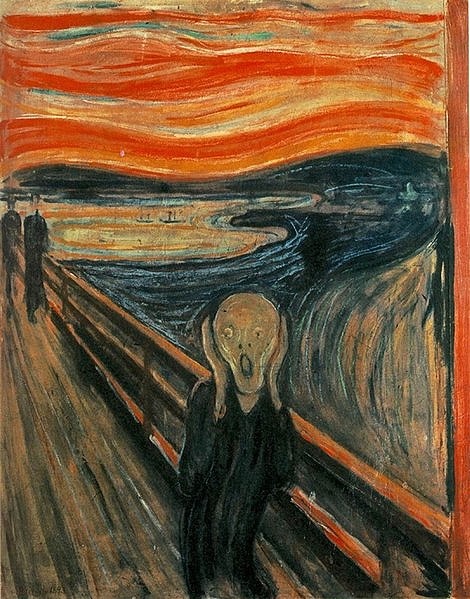RushingRoulette

Edvard Munch, At the Roulette Table in Monte Carlo,1892
"Rushing into any roulette seems a fool's mission."
Every morning, some oleaginous politician encourages me to resume my "normal" activities, citing genuine statistics to justify their advice. I deeply doubt if they understand a word of their own justifications, for oleaginous politicians have never been elected on the basis of their deep understanding of Bayes theorem, or any other concept underlying statistical projection. Judging from the wild divergence between predicted and actual, their understanding might well be nonexistent, but true to all of us genuinely innumerate, mere failure to accurate predict hardly dissuades another morning spent hawking spurious convictions. Statistics has always been hard, mostly because our intuitions sucker us. Unbiased analysis demands an almost inhuman indifference and strict adherence to tenaciously counter-intuitive processes. Even analyzing results easily sucker-punches us, since we sometimes desperately want the numbers to agree with our a priori expectations, and when they do not, we're likely to fudge, touting the portion of the results that agree with us and burying those that don't.
We wallow in numbers now. Data analysis has become a part of every professional's job description, much in the way that dictation once was. Few could very efficiently dictate then and probably fewer effectively analyze data today, and even those expert in the craft must pass their results up through layers of overseers not nearly as scrupulous as the purveyor. The data analyst models for insight, not for answers, and deeply understands that the subsequent analysis and understanding makes or breaks the quality of the resulting insight. Politicals ask their questions to be answered, not to 'merely' gain deeper insight, and when the analysis delivers another fuzzy, ambiguous picture, they're more than likely to make up a position-supporting interpretation than to learn anything from the paper.
It seems from most perspectives, that this novel corona virus could not possibly be a serious threat, for all the associated numbers seem trivial. The probability of death remains in low single digits. The likelihood of contracting, an essentially unknown variable, likewise appears hardly threatening. One percent seems to mean rare and unlikely, but appearances mislead when dealing with statistical entities, for these are not discretely countable things, but smears and obtuse averages. Nobody has a family with 3.2 kids, whatever the population analysis says, and even experienced data analysts get confused when the effects of even normal variation comes into play. The truth, today, cannot be accurately calculated, it depending upon a raft of essentially unknown quantities, and our guesses, even our well-considered guesses, tend to gang up on us. We've declined innumerable opportunities to learn better, to know better, but have so-far favored our gut-level intuitions, a facility statistical analysis was specifically designed to counter.
This muddle leaves me deeply distrusting the oleaginous optimists promoting returning to normalcy. In a world ruled by unknowable probabilities, normalcy itself becomes unrecognizable, with simple nostalgia filling in. Longingly aspiring for a time and a place clearly out-paced by circumstance could not possibly manifest it here, in this time and place. Our lifeboat experiments in inducing rushed return to nostalgic normalcy should deeply inform society, especially one ordering refrigerated morgue truck to supplement existing infrastructure. The urgency seems lemming like, a rushing to shared oblivion rather than salvation. I'll label this insistent urge Rushing Roulette, playing on that old suicidal "game." We play ours differently, though, for once we dodge a bullet, we insert another bullet into the cylinder and spin again, for this is the effect of our ever-deepening misunderstandings of statistical projections. The numbers might imply, to the oleaginous eye, that we're well on our way to succeeding. Leading the results, some figure that we might just as well open 'er back up, since even if we all eventually contract the disease, almost all of us will apparently very likely survive.
Roulette is one game where the only certain way to win involves just not playing the game. Rushing Roulette's the same. Hasten Slowly is just about the only principle we remember today from the Ancient Romans' building culture. They created roads still driven on two thousand years and more later, and water works which continue to service great cities, and these without the benefit of Bayes theorem. They seem painstaking when compared with our more modern Warp Speed everything ethic. Our kids and grandkids provide our only opportunity to pass forward our wisdoms as well as our stupidities. Sending them into schools politically enjoined from acknowledging some of the more fundamental wisdoms we espouse damns us to a legacy more representative of our underlying stupidities. Nobody plays roulette to make money, but to demonstrate how much they can afford to lose. Anyone playing for gain, ultimately shames themselves. Red or Black, Odd or Even, even a long-proven lucky number most likely produces another loser. Rushing into any roulette seems a fool's mission.

After roulette: Edvard Munch, The Scream, 1893
©2020 by David A. Schmaltz - all rights reserved


